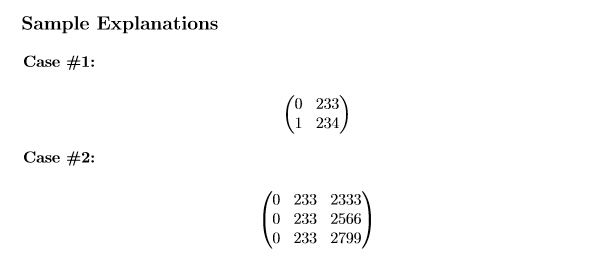- 74. 搜索二维矩阵
zmuy
LeetCodehot100矩阵算法线性代数
题目:给你一个满足下述两条属性的mxn整数矩阵:每行中的整数从左到右按非严格递增顺序排列。每行的第一个整数大于前一行的最后一个整数。给你一个整数target,如果target在矩阵中,返回true;否则,返回false。示例:输入:matrix=[[1,3,5,7],[10,11,16,20],[23,30,34,60]],target=3输出:true解题思路:如果我们将矩阵按行拼接成一个一维矩
- 【unitrix】 4.12 通用2D仿射变换矩阵(matrix/types.rs)
liuyuan77
我的unitrix库rust
一、源码这段代码定义了一个通用的2D仿射变换矩阵结构,可用于表示二维空间中的各种线性变换。///通用2D仿射变换矩阵(元素仅需实现Copytrait)//////该矩阵可用于表示二维空间中的任意仿射变换,支持以下应用场景:///1.平面几何转换(平移/旋转/缩放/剪切)///2.颜色空间线性变换(如RGB到YUV转换)///3.带物理单位的量值转换(如像素到毫米的映射)///4.动画系统中的插值变
- 机器学习笔记:MATLAB实践
techDM
机器学习笔记matlabMatlab
在机器学习领域,MATLAB是一种功能强大且广泛使用的工具,它提供了许多内置函数和工具箱,方便开发者进行各种机器学习任务。本文将介绍一些常见的机器学习任务,并提供相应的MATLAB源代码示例。数据预处理在进行机器学习之前,通常需要对原始数据进行预处理。这包括数据清洗、特征选择、特征缩放和数据划分等步骤。%导入数据data=readmatrix('data.csv');%数据清洗cleaned_da
- 面试150 旋转图像
Alfred king
面试150题目面试leetcode数组
思路解包法。zip函数可以使矩阵转置,本题需要对矩阵先反转在转置。因此联想到zip是一种很简便的方法classSolution:defrotate(self,matrix:List[List[int]])->None:"""Donotreturnanything,modifymatrixin-placeinstead."""matrix[:]=zip(*matrix[::-1])
- canvas数字雨
给我焦虑
canvasvue
exportdefault{name:'vue-matrix-raindrop',//插件的各种参数props:{//canvas宽度canvasWidth:{type:Number,default:800},//canvas高度canvasHeight:{type:Number,default:600},//下落字体大小fontSize:{type:Number,default:20},//字体
- 力扣74 搜索二维矩阵
许愿与你永世安宁
力扣刷题笔记leetcode矩阵算法
获取矩阵的行数和列数vector>&matrixmatrix是一个vector>类型的二维向量,其本质是一个嵌套的动态数组matrix.size()返回的是外层vector的大小,即有多少个vector元素,也就是二维向量的行数matrix[0]是第一行的vector,即第一个vector元素matrix[0].size()返回第一行的大小,也就是该行中int元素的数量,即列数一维索引与二维坐标的
- 爪形行列式
CyberMuse
算法
好的!我用一个具体的数值4阶“爪形”矩阵举例,配合一步一步推导,完整展示“列变换消元求行列式”的过程。---#例题计算行列式\[D=\begin{vmatrix}4&2&3&1\\6&5&0&0\\7&0&4&0\\8&0&0&3\end{vmatrix}.\]---#Step1:确认结构-第一行:\(a_0=4,b_1=2,b_2=3,b_3=1\);-从第二行开始主对角为\(a_1=5,a_2
- 左神算法之有序二维矩阵中的目标值查找
岳轩子
左神算法算法矩阵线性代数
有序二维矩阵中的目标值查找目录有序二维矩阵中的目标值查找1.题目描述2.问题解释3.解决思路方法一:逐行二分查找(适合行数较少的情况)方法二:利用行列有序特性(最优解)4.代码实现5.总结1.题目描述给定一个元素为非负整数的二维数组matrix,其中:每一行按照从左到右递增的顺序排列每一列按照从上到下递增的顺序排列再给定一个非负整数aim,请判断aim是否存在于matrix中。示例:int[][]
- 如何保证软件质量?汽车软件基于模型开发的十个问题与质量工具推荐
MESMarketing
自动驾驶
如何保证软件质量?汽车软件基于模型开发的十个问题与质量工具推荐基于模型的软件开发(MBD)在20世纪90年代兴起,当时Simulink®和Matrix®等工具正在从学术或研究领域过渡到生产支持领域。MBD在1999年引入高效自动代码生成后,借助EmbeddedCoder®和TargetLink®等工具迅速扩展。随着电子电器系统日趋复杂,有别于传统的软件开发,基于模型的软件开发成为自动化行业贴别是汽
- PyTorch study notes[4]
文章目录thesystemofequationsreferencesthesystemofequationsthedefinitionofmatrixwithmathematicalform.thefollowingsamplecodeexpressesthemaxtrixandsquarematrix.importtorch#从Python列表创建矩阵matrix=torch.tensor([[
- Python打卡:Day24
剑桥折刀s
python打卡python
importpandasaspdimportnumpyasnpimportreimportxgboostasxgbfromsklearn.model_selectionimporttrain_test_splitfromsklearn.metricsimportclassification_report,confusion_matrix,accuracy_score,precision_score
- 从零理解鱼眼相机的标定与矫正(含 OpenCV 代码与原理讲解)
本文适合初学者系统掌握鱼眼镜头的标定与矫正原理,图文结合,带你从0到1理解K,D,u,v等参数的真实含义。一句话总结鱼眼相机由于镜头视角宽、畸变大,拍出来的画面会“鼓起来”或者变形。通过标定得到的参数,可以让计算机“理解”这种变形是怎么发生的,并据此把图像“拉回正形”。一、什么是内参矩阵K?定义在OpenCV中,内参矩阵(CameraIntrinsicMatrix)通常是一个3x3的矩阵:cfg.
- 如何在 CloudMatrix 384 超节点上部署 DeepSeek 大模型:业界首次公开非英伟达体系下解决此类技术难题的论文
猫头虎
猫头虎AI探索之路计算机视觉人工智能tensorflow深度学习机器学习语言模型chatgpt
本文基于华为团队与硅基流动(SiliconFlow)联合署名的论文《ServingLargeLanguageModelsonHuaweiCloudMatrix384》的简要解说与技术分析文章,深入剖析了CloudMatrix384架构设计、CloudMatrix-Infer推理引擎实现及其在DeepSeek-R1模型上的性能表现。文章目录1.引言2.背景与动机2.1LLM发展趋势与部署挑战2.2非
- c++_矩阵转置
惊讶的猫
算法数据结构
什么是矩阵转置?一个n×n的方阵matrix,其转置矩阵是:将原矩阵的行变为列,列变为行。也就是说,matrix[i][j]→matrix[j][i]。举个例子:原始矩阵:123456789转置后应该变成:147258369你可以看到:matrix[0][1]=2→matrix[1][0]=2matrix[2][1]=8→matrix[1][2]=8等等。我们要怎么用代码实现它呢?请看下面的代码:
- 华为OD机考-上班之路/是否能到达公司-DFS(JAVA 2025B卷)
小猫咪怎么会有坏心思呢
华为机考华为od宽度优先算法
importjava.util.*;publicclassGoWork{privatestaticfinalint[][]directions={{0,1,1},{0,-1,2},{1,0,3},{-1,0,4}};privatestaticintmaxTurns,maxClears,rows,cols;privatestaticchar[][]matrix;publicstaticvoidmai
- matlab读取txt到矩阵,如何在MATLAB中将文本文件中的数据读入矩阵(How to read data from a text file into a matrix in MATLAB)...
akshay_pachaar
matlab读取txt到矩阵
如何在MATLAB中将文本文件中的数据读入矩阵(HowtoreaddatafromatextfileintoamatrixinMATLAB)我在将.txt文件读入单个矩阵时遇到困难,行和列显示在MATLAB的下面文本中。%Q1Q2Q3Q4Q542905525322355708953我将如何创建一个只有来自该文本文件的数字的单个矩阵?值由空格分隔。有19行,但我希望能够在发生更改时使用任意数量的行和
- Labelmatrix7.0:专业条码编辑软件深度解析
韦臻
本文还有配套的精品资源,点击获取简介:Labelmatrix7.0是一个为设计和打印条码标签而开发的专业软件,其直观易用的界面和强大的功能使其在多个行业中得到广泛应用。软件提供多种条码格式支持、丰富的图形和文本编辑功能以及高效的数据集成能力。用户还可以利用批量打印和预览功能以及便捷的模板管理和错误检查等特性,提升工作效率并降低运营成本。1.条码编辑软件简介条码编辑软件是自动化数据收集、管理和信息处
- GNU Octave 基础教程(3):变量与数据类型详解(一)
方博士AI机器人
GNUOctave基础教程Octave数据分析
目录1.变量的定义2.变量命名规则3.常见数据类型3.1.数值类型(Numeric)3.2.布尔值(Logical)3.3.字符与字符串3.4.向量(Vector)3.5.矩阵(Matrix)4.命令窗口中的实用操作5.总结1.变量的定义在Octave中,变量的定义非常直观,只需要使用赋值符号=即可,比如:x=true;%布尔name='Alice';%字符temperature=36.5;%浮点
- 安装黑客帝国矩阵效果
Fajsgsidgkshs
linux运维服务器
1安装aalib、aview、ImageMagick、cmatrix用xshell软件连接到虚拟机把这三个的zip包放进虚拟机中,然后进行解压,以第一个为例tarxfaalib-1.4rc5.tar.gzcdaalib-1.4.0/./configuremakemakeinstall其余解压方式跟上面类似。将所有的包进行解压和make创建之后然后进行验证,输入cmatrix如果出现这样的页面说明安
- 主成分分析(PCA)例题——给定协方差矩阵
phoenix@Capricornus
PR书稿矩阵线性代数
向量xxx的相关矩阵为Rx=[0.30.10.10.10.3−0.10.1−0.10.3]{\bmR}_x=\begin{bmatrix}0.3&0.1&0.1\\0.1&0.3&-0.1\\0.1&-0.1&0.3\end{bmatrix}Rx=0.30.10.10.10.3−0.10.1−0.10.3计算输入向量的KL变换。解答Rx{\bmR}_xRx的特征值为λ0=0.1\lambda_0=
- 螺旋矩阵C++
monicaaaaan
乐扣刷题矩阵c++算法
给你一个m行n列的矩阵matrix,请按照顺时针螺旋顺序,返回矩阵中的所有元素。classSolution{public:vectorspiralOrder(vector>&matrix){if(matrix.empty()||matrix[0].empty())return{};intm=matrix.size();//行数intn=matrix[0].size();//列数vectorres;
- 力扣刷题73:矩阵置零C++
刘心芝士小蛋糕
力扣刷题c++矩阵置零
解题思路原地算法:输出结果覆盖输入结果,不额外开辟内存和空间具体步骤:1.使用两个标记量记录首行首列是否需要置零2.扫描非首行首列的置零信息3.回过头来将根据标记量将首行首列是否置零代码classSolution{public:voidsetZeroes(vector>&matrix){intm=matrix.size();//行intn=matrix[0].size();//列intcol0=f
- LeetCode-73. 矩阵置零-C++
工程欣欣
LeetCode每日一题leetcode矩阵c++
给定一个mxn的矩阵,如果一个元素为0,则将其所在行和列的所有元素都设为0。请使用原地算法。示例1:输入:matrix=[[1,1,1],[1,0,1],[1,1,1]]输出:[[1,0,1],[0,0,0],[1,0,1]]示例2:输入:matrix=[[0,1,2,0],[3,4,5,2],[1,3,1,5]]输出:[[0,0,0,0],[0,4,5,0],[0,3,1,0]]代码实现,带详细
- 华为OD机试-返回矩阵中非1的元素、个数/数值同化-BFS(JAVA 2025B卷)
小猫咪怎么会有坏心思呢
华为机考华为od深度优先java
importjava.util.*;/***@author308413*@versionVer1.0*@date2025/6/18*@description返回矩阵中非1的元素*/publicclassNon1ElementInMatrix{publicstaticvoidmain(String[]args){Scannerscanner=newScanner(System.in);intN=sc
- 数据库选型之路YMatrix与Clickhouse对比
星*语
数据库数据仓库时序数据库
背锅我们是被迫的数据库问题‘触发’越来越频繁了,开发、业务人员也一直抱怨数据库不行,作为运维人员,天天各种处理问题,还被其他部门喷,有问题矛头全部指向数据库。刚上任的部门领导整天也是压力山大,内部会议分析了当前的情况,最终解决方案是架构变更。当前的生产系统运行在Mysql上,从开始的保留半年的数据,到现在缩减到保留不足三个月的数据,全量数据实时同步到Hadoop,随着业务的发展,Mysql和Had
- 使用C++在Ubuntu系统中模拟数字雨效果
ghie9090
c++ubuntu数据库
模拟数字雨(MatrixRain)效果,好像直接走进了电影《黑客帝国》的数字荒原。想实现这个酷炫的效果?让我们在Ubuntu系统上,使用C++,以及ncurses库来点亮你的终端屏幕。首先,你得有g++编译器和ncurses库。不用担心,Ubuntu通通有提供。打开终端,轻松安装:sudoapt-getinstallg++libncurses5-devlibncursesw5-dev噼里啪啦,一堆
- 矩阵基础知识 - 游戏开发必学
杰_happy
数学矩阵线性代数游戏开发
矩阵定义一个m×n的矩阵是一个由m行n列元素排列成的矩形阵列,矩阵里的元素可以是数字、符号或数学式。以下是一个由6个数构成的2行3列的矩阵:(1912−1990)\begin{pmatrix}1&9&12\\-19&9&0\end{pmatrix}(1−1999120)对于m×n的矩阵,如果m=n,则这样的矩阵叫做方阵,对于一般的矩阵,可以表示为:A=(a1,1a1,2⋯a1,na2,1a2,2⋯
- 九日集训第七天
让我访问!
蓝桥杯算法leetcode
一今日作业1.统计有序矩阵中的负数intcountNegatives(int**grid,intgridSize,int*gridColSize){inti,j,a=0;for(j=0;j0,jmax)max=ans;ans=0;}returnmax;}4.托普利茨矩阵boolisToeplitzMatrix(int**matrix,intmatrixSize,int*matrixColSize)
- K均值聚类例题
phoenix@Capricornus
均值算法聚类机器学习
给定5个样本的样本矩阵X⊤=[0015520002]{\bmX}^\top=\begin{bmatrix}0&0&1&5&5\\2&0&0&0&2\end{bmatrix}X⊤=[0200105052]使用KKK均值聚类算法将样本聚到两个类中。选择两个样本点x1=(0,2)⊤{\bmx}_1=(0,2)^\topx1=(0,2)⊤,x2=(0,0)⊤{\bmx}_2=(0,0)^\topx2=(0
- 算法22-----托普利茨矩阵leetcode766
weixin_33966095
数据结构与算法
1、题目如果一个矩阵的每一方向由左上到右下的对角线上具有相同元素,那么这个矩阵是托普利茨矩阵。给定一个MxN的矩阵,当且仅当它是托普利茨矩阵时返回True。示例1:输入:matrix=[ [1,2,3,4], [5,1,2,3], [9,5,1,2]]输出:True解释:在上述矩阵中,其对角线为:"[9]","[5,5]","[1,1,1]","[2,2,2]","[3,3]","[4]"。各条对
- apache ftpserver-CentOS config
gengzg
apache
<server xmlns="http://mina.apache.org/ftpserver/spring/v1"
xmlns:xsi="http://www.w3.org/2001/XMLSchema-instance"
xsi:schemaLocation="
http://mina.apache.o
- 优化MySQL数据库性能的八种方法
AILIKES
sqlmysql
1、选取最适用的字段属性 MySQL可以很好的支持大数据量的存取,但是一般说来,数据库中的表越小,在它上面执行的查询也就会越快。因此,在创建表的时候,为了获得更好的 性能,我们可以将表中字段的宽度设得尽可能小。例如,在定义邮政编码这个字段时,如果将其设置为CHAR(255),显然给数据库增加了不必要的空间,甚至使用VARCHAR这种类型也是多余的,因为CHAR(6)就可以很
- JeeSite 企业信息化快速开发平台
Kai_Ge
JeeSite
JeeSite 企业信息化快速开发平台
平台简介
JeeSite是基于多个优秀的开源项目,高度整合封装而成的高效,高性能,强安全性的开源Java EE快速开发平台。
JeeSite本身是以Spring Framework为核心容器,Spring MVC为模型视图控制器,MyBatis为数据访问层, Apache Shiro为权限授权层,Ehcahe对常用数据进行缓存,Activit为工作流
- 通过Spring Mail Api发送邮件
120153216
邮件main
原文地址:http://www.open-open.com/lib/view/open1346857871615.html
使用Java Mail API来发送邮件也很容易实现,但是最近公司一个同事封装的邮件API实在让我无法接受,于是便打算改用Spring Mail API来发送邮件,顺便记录下这篇文章。 【Spring Mail API】
Spring Mail API都在org.spri
- Pysvn 程序员使用指南
2002wmj
SVN
源文件:http://ju.outofmemory.cn/entry/35762
这是一篇关于pysvn模块的指南.
完整和详细的API请参考 http://pysvn.tigris.org/docs/pysvn_prog_ref.html.
pysvn是操作Subversion版本控制的Python接口模块. 这个API接口可以管理一个工作副本, 查询档案库, 和同步两个.
该
- 在SQLSERVER中查找被阻塞和正在被阻塞的SQL
357029540
SQL Server
SELECT R.session_id AS BlockedSessionID ,
S.session_id AS BlockingSessionID ,
Q1.text AS Block
- Intent 常用的用法备忘
7454103
.netandroidGoogleBlogF#
Intent
应该算是Android中特有的东西。你可以在Intent中指定程序 要执行的动作(比如:view,edit,dial),以及程序执行到该动作时所需要的资料 。都指定好后,只要调用startActivity(),Android系统 会自动寻找最符合你指定要求的应用 程序,并执行该程序。
下面列出几种Intent 的用法
显示网页:
- Spring定时器时间配置
adminjun
spring时间配置定时器
红圈中的值由6个数字组成,中间用空格分隔。第一个数字表示定时任务执行时间的秒,第二个数字表示分钟,第三个数字表示小时,后面三个数字表示日,月,年,< xmlnamespace prefix ="o" ns ="urn:schemas-microsoft-com:office:office" />
测试的时候,由于是每天定时执行,所以后面三个数
- POJ 2421 Constructing Roads 最小生成树
aijuans
最小生成树
来源:http://poj.org/problem?id=2421
题意:还是给你n个点,然后求最小生成树。特殊之处在于有一些点之间已经连上了边。
思路:对于已经有边的点,特殊标记一下,加边的时候把这些边的权值赋值为0即可。这样就可以既保证这些边一定存在,又保证了所求的结果正确。
代码:
#include <iostream>
#include <cstdio>
- 重构笔记——提取方法(Extract Method)
ayaoxinchao
java重构提炼函数局部变量提取方法
提取方法(Extract Method)是最常用的重构手法之一。当看到一个方法过长或者方法很难让人理解其意图的时候,这时候就可以用提取方法这种重构手法。
下面是我学习这个重构手法的笔记:
提取方法看起来好像仅仅是将被提取方法中的一段代码,放到目标方法中。其实,当方法足够复杂的时候,提取方法也会变得复杂。当然,如果提取方法这种重构手法无法进行时,就可能需要选择其他
- 为UILabel添加点击事件
bewithme
UILabel
默认情况下UILabel是不支持点击事件的,网上查了查居然没有一个是完整的答案,现在我提供一个完整的代码。
UILabel *l = [[UILabel alloc] initWithFrame:CGRectMake(60, 0, listV.frame.size.width - 60, listV.frame.size.height)]
- NoSQL数据库之Redis数据库管理(PHP-REDIS实例)
bijian1013
redis数据库NoSQL
一.redis.php
<?php
//实例化
$redis = new Redis();
//连接服务器
$redis->connect("localhost");
//授权
$redis->auth("lamplijie");
//相关操
- SecureCRT使用备注
bingyingao
secureCRT每页行数
SecureCRT日志和卷屏行数设置
一、使用securecrt时,设置自动日志记录功能。
1、在C:\Program Files\SecureCRT\下新建一个文件夹(也就是你的CRT可执行文件的路径),命名为Logs;
2、点击Options -> Global Options -> Default Session -> Edite Default Sett
- 【Scala九】Scala核心三:泛型
bit1129
scala
泛型类
package spark.examples.scala.generics
class GenericClass[K, V](val k: K, val v: V) {
def print() {
println(k + "," + v)
}
}
object GenericClass {
def main(args: Arr
- 素数与音乐
bookjovi
素数数学haskell
由于一直在看haskell,不可避免的接触到了很多数学知识,其中数论最多,如素数,斐波那契数列等,很多在学生时代无法理解的数学现在似乎也能领悟到那么一点。
闲暇之余,从图书馆找了<<The music of primes>>和<<世界数学通史>>读了几遍。其中素数的音乐这本书与软件界熟知的&l
- Java-Collections Framework学习与总结-IdentityHashMap
BrokenDreams
Collections
这篇总结一下java.util.IdentityHashMap。从类名上可以猜到,这个类本质应该还是一个散列表,只是前面有Identity修饰,是一种特殊的HashMap。
简单的说,IdentityHashMap和HashM
- 读《研磨设计模式》-代码笔记-享元模式-Flyweight
bylijinnan
java设计模式
声明: 本文只为方便我个人查阅和理解,详细的分析以及源代码请移步 原作者的博客http://chjavach.iteye.com/
import java.util.ArrayList;
import java.util.Collection;
import java.util.HashMap;
import java.util.List;
import java
- PS人像润饰&调色教程集锦
cherishLC
PS
1、仿制图章沿轮廓润饰——柔化图像,凸显轮廓
http://www.howzhi.com/course/retouching/
新建一个透明图层,使用仿制图章不断Alt+鼠标左键选点,设置透明度为21%,大小为修饰区域的1/3左右(比如胳膊宽度的1/3),再沿纹理方向(比如胳膊方向)进行修饰。
所有修饰完成后,对该润饰图层添加噪声,噪声大小应该和
- 更新多个字段的UPDATE语句
crabdave
update
更新多个字段的UPDATE语句
update tableA a
set (a.v1, a.v2, a.v3, a.v4) = --使用括号确定更新的字段范围
- hive实例讲解实现in和not in子句
daizj
hivenot inin
本文转自:http://www.cnblogs.com/ggjucheng/archive/2013/01/03/2842855.html
当前hive不支持 in或not in 中包含查询子句的语法,所以只能通过left join实现。
假设有一个登陆表login(当天登陆记录,只有一个uid),和一个用户注册表regusers(当天注册用户,字段只有一个uid),这两个表都包含
- 一道24点的10+种非人类解法(2,3,10,10)
dsjt
算法
这是人类算24点的方法?!!!
事件缘由:今天晚上突然看到一条24点状态,当时惊为天人,这NM叫人啊?以下是那条状态
朱明西 : 24点,算2 3 10 10,我LX炮狗等面对四张牌痛不欲生,结果跑跑同学扫了一眼说,算出来了,2的10次方减10的3次方。。我草这是人类的算24点啊。。
然后么。。。我就在深夜很得瑟的问室友求室友算
刚出完题,文哥的暴走之旅开始了
5秒后
- 关于YII的菜单插件 CMenu和面包末breadcrumbs路径管理插件的一些使用问题
dcj3sjt126com
yiiframework
在使用 YIi的路径管理工具时,发现了一个问题。 <?php
- 对象与关系之间的矛盾:“阻抗失配”效应[转]
come_for_dream
对象
概述
“阻抗失配”这一词组通常用来描述面向对象应用向传统的关系数据库(RDBMS)存放数据时所遇到的数据表述不一致问题。C++程序员已经被这个问题困扰了好多年,而现在的Java程序员和其它面向对象开发人员也对这个问题深感头痛。
“阻抗失配”产生的原因是因为对象模型与关系模型之间缺乏固有的亲合力。“阻抗失配”所带来的问题包括:类的层次关系必须绑定为关系模式(将对象
- 学习编程那点事
gcq511120594
编程互联网
一年前的夏天,我还在纠结要不要改行,要不要去学php?能学到真本事吗?改行能成功吗?太多的问题,我终于不顾一切,下定决心,辞去了工作,来到传说中的帝都。老师给的乘车方式还算有效,很顺利的就到了学校,赶巧了,正好学校搬到了新校区。先安顿了下来,过了个轻松的周末,第一次到帝都,逛逛吧!
接下来的周一,是我噩梦的开始,学习内容对我这个零基础的人来说,除了勉强完成老师布置的作业外,我已经没有时间和精力去
- Reverse Linked List II
hcx2013
list
Reverse a linked list from position m to n. Do it in-place and in one-pass.
For example:Given 1->2->3->4->5->NULL, m = 2 and n = 4,
return
- Spring4.1新特性——页面自动化测试框架Spring MVC Test HtmlUnit简介
jinnianshilongnian
spring 4.1
目录
Spring4.1新特性——综述
Spring4.1新特性——Spring核心部分及其他
Spring4.1新特性——Spring缓存框架增强
Spring4.1新特性——异步调用和事件机制的异常处理
Spring4.1新特性——数据库集成测试脚本初始化
Spring4.1新特性——Spring MVC增强
Spring4.1新特性——页面自动化测试框架Spring MVC T
- Hadoop集群工具distcp
liyonghui160com
1. 环境描述
两个集群:rock 和 stone
rock无kerberos权限认证,stone有要求认证。
1. 从rock复制到stone,采用hdfs
Hadoop distcp -i hdfs://rock-nn:8020/user/cxz/input hdfs://stone-nn:8020/user/cxz/运行在rock端,即源端问题:报版本
- 一个备份MySQL数据库的简单Shell脚本
pda158
mysql脚本
主脚本(用于备份mysql数据库): 该Shell脚本可以自动备份
数据库。只要复制粘贴本脚本到文本编辑器中,输入数据库用户名、密码以及数据库名即可。我备份数据库使用的是mysqlump 命令。后面会对每行脚本命令进行说明。
1. 分别建立目录“backup”和“oldbackup” #mkdir /backup #mkdir /oldbackup
- 300个涵盖IT各方面的免费资源(中)——设计与编码篇
shoothao
IT资源图标库图片库色彩板字体
A. 免费的设计资源
Freebbble:来自于Dribbble的免费的高质量作品。
Dribbble:Dribbble上“免费”的搜索结果——这是巨大的宝藏。
Graphic Burger:每个像素点都做得很细的绝佳的设计资源。
Pixel Buddha:免费和优质资源的专业社区。
Premium Pixels:为那些有创意的人提供免费的素材。
- thrift总结 - 跨语言服务开发
uule
thrift
官网
官网JAVA例子
thrift入门介绍
IBM-Apache Thrift - 可伸缩的跨语言服务开发框架
Thrift入门及Java实例演示
thrift的使用介绍
RPC
POM:
<dependency>
<groupId>org.apache.thrift</groupId>
